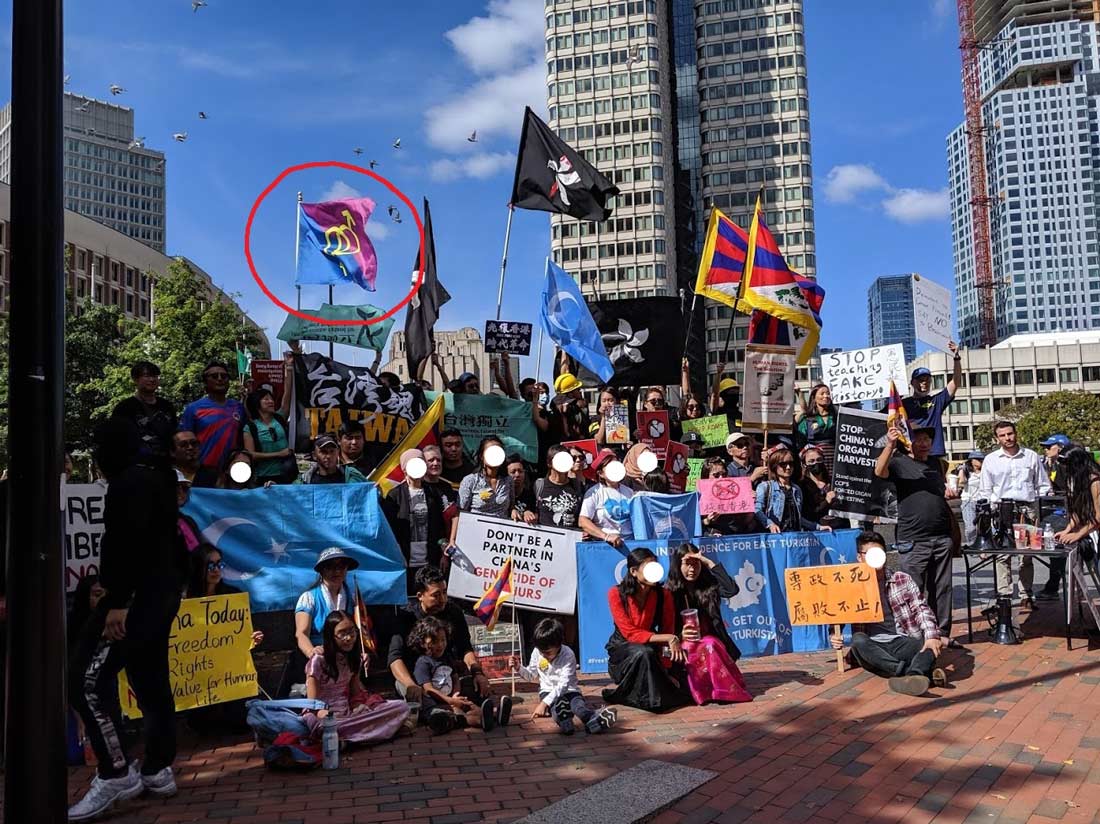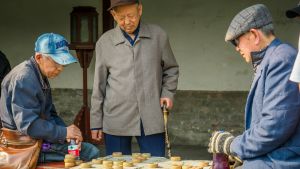
We Stood on Opposite Sides at a Pro-Hong Kong Rally—and Became Friends
On 29 September, amid global anti-totalitarianism protests (Cheng 2019), pro-Hong Kong activists in Boston called for the disruption of the city’s annual People’s Republic of China (PRC) flag-raising ceremony.
Anticipating conflict, the Boston police put up street barricades, separating the crowd into two groups. On the inside were elderly Chinese residents from Boston’s Chinatown and the Greater Boston area, who came to participate in the celebrations. On the outside stood Hongkongers, Tibetans, Uyghurs, and Taiwanese. Sensing an opportunity to express their anti-Chinese xenophobic hatred, groups of white supremacists, right-wing Trump supporters, and ‘straight pride’ activists also showed up at the rally.
Two activists who did not know each other previously—JS, a member of the Hong Kong collective Lausan, and K., a local Chinese-American community organiser—stood on opposite sides of the protest but left the event as friends. Unsure of each other’s political views, they were cautious when first exchanging opinions, but what began as a hostile assessment of each other’s politics ended in mutual dissatisfaction over the protest’s message.
In this op-ed, they share their perspectives from different sides of the barricade and reflect on the possibilities for solidarity between Hongkongers and mainland Chinese people, especially overseas.

The Perspective of JS, a Pro-Hong Kong Protester
As part of the Hong Kong diaspora, I wanted to take part in the protests on 29 September to show solidarity with the movement. However, I felt uneasy about the staunch anti-China sentiment of disrupting the PRC flag-raising ceremony, and was not sure who exactly we would be protesting against.
On the subway ride down to the rally I encountered a group of four elderly women who were seated across from me. They dressed plainly and spoke Mandarin. I became suddenly self-conscious of my all-black attire and the ‘Stand With Hong Kong’ sticker I had stuck on my backpack earlier in the week. They were headed for the flag-raising ceremony, the same one that I was going to protest against.
By 10:30am, as many as 70 people, mostly clad in black, piled into the main square. Protesters representing Tibet, Xinjiang, and Taiwan were also present, each group carrying signs denouncing the Chinese Communist Party’s (CCP) tyranny in their respective homelands. I stood with the pro-Hong Kong activists, chanting ‘Five demands, not one less’ and other staple slogans of the Hong Kong movement. But as more Chinese immigrants showed up for the ceremony, the chants turned ugly and began targeting the people instead. ‘Communists, go back to China!’ protesters yelled, echoing the McCarthyism of the 1950s. ‘This is America!’
That is when Trump supporters, right-wing Christian groups, white supremacists, and ‘straight pride’ marchers began to arrive, joining our side of the barricade—clearly hoping to take advantage of the unfolding conflict to further their Sinophobic agenda. They jeered at the crowd of Chinese immigrants. A white woman wearing a Trump hat stood by the barricade, shouting ‘Shame on the United States for letting communists in!’ She started pointing an elderly person across the barricade and yelled: ‘Are you a fucking communist?’
I suddenly felt ashamed and disoriented. Noticing a woman around my age on the other side of the barricade, I asked: ‘Excuse me miss, can you tell me more about the people at the ceremony?’ She introduced herself as K., a community organiser, and explained the attendees were low-income, elderly immigrants living in Boston’s Chinatown. Many of them were tenant organisers in their own right. Some were even involved with the labour union Unite Here Local 26 and participated in the Marriott strike in 2018—a strike I had gone out to support (Johnston 2018). Learning this, my heart sank. I never thought that one day I would be standing across a barricade from these Marriott strikers.
When I reflect on that day, I find it bewildering to think about the alliances that formed in hostility toward Chinese immigrants. I feel sick thinking about pro-Hong Kong activists sharing their megaphones with white supremacist Trump supporters, and seeing photographs of the ‘straight pride’ flag waving among Taiwanese, Tibetans, and Uyghurs.
Intentionally or not, the call to disrupt the PRC flag-raising ceremony had turned Chinese immigrants into targets, and worse still, allowed what could have been an opportunity for discussion and solidarity to descend into the latest iteration of Yellow Peril discourse. If pro-Hong Kong activists abroad continue to adopt rhetoric that invites right-wing groups to their rallies, these protests could easily become breeding grounds for a new Sinophobic movement. Instead of perpetuating white nationalism in pitting the West against China, we must carefully draw a line between pro-Hong Kong solidarity and anti-Chinese racism.
In many ways, the Boston protest reflects both the nativism that has emerged out of the Hong Kong movement, and the nationalism which results from indoctrination by Chinese state media. In reality, this opposition is constructed. Working-class mainlanders and Hong Kong protesters should be natural allies—both groups are exploited and repressed by the CCP’s authoritarian state capitalism. Sadly, it is increasingly impossible to build these relationships in Hong Kong or in the mainland: expressing pro-Hong Kong sentiments in the mainland can result in censorship or even arrest, while expressing any sympathy for the concerns of mainland Chinese in Hong Kong can provoke a fierce backlash from protesters.
This is where the diaspora may play a critical role: it is overseas that Hongkongers and Chinese people can still safely engage in dialogue. For Hongkongers hoping to challenge China’s rising nationalism, it is crucial that we build stronger relationships with the millions of Chinese living outside of the mainland’s borders. Here, perhaps we can imagine an entirely new relationship between Hongkongers and mainlanders—one that is not based on nativism or nationalism, but a shared sense of solidarity.

The Perspective of K., a PRC Flag-raising Ceremony Volunteer
His arm wound back as he prepared to punch the man across the barricade. Before I knew it, I threw myself between the two men to prevent another fight from breaking out.
I decided to volunteer at the PRC flag-raising ceremony to support the Chinese Progressive Association (CPA) in Boston and the community members they brought to the event. Having been a part of the CPA and the broader Chinatown community in Boston, I knew many of the attendees—most were low-income, working-class Chinese immigrants. Outside of the barricade I saw Qing, a hotel worker and member of Boston’s Unite Here Local 26, looking for a safe path to join the ceremony with her family. Qing led chants and spoke at rallies to mobilise other hotel workers. I also ran into Mah-wah, a resident of a nearby senior housing building, whom I steered away from belligerent protesters and towards a safe spot to sit. Mah-wah frequently came out to fight for affordable housing in an increasingly gentrified Chinatown. These attendees were organisers and leaders in the community, fighting to improve the living and working conditions of the Chinese diaspora in Boston.
As a Chinese-American born and raised around Boston’s Chinatown, I did not attend the ceremony to support the CCP. Rather, this flag raising ceremony was a tradition established by Asian American organisers in the 1990s. Until US–China relations were normalised in 1979, the Chinese diasporic community in the United States could not speak freely to or about their family without a visit from the FBI. They were frequent targets of red-baiting and lived under fear of persecution. The initial ceremony represented the acknowledgement of the Chinese-American community and the years spent organising against discrimination.
CPA’s work organising the flag-raising ceremony is one example of over four decades worth of grassroots community organising. Their work spans across youth, tenant, and labour organising, along with civic engagement and voter outreach.
Having worked closely with the community that would be attending the flag-raising ceremony, I felt conflicted. To them, the flag represented a very different thing than to those who came out to protest—it reminded them of a home they left. Even though that meaning did not resonate with me, I still wanted to support them, and even protect them.
Heading to the ceremony, I was ready to be confronted by anti-CCP protestors. From inside the barricade, I looked over to the crowd of protestors. I saw signs about the CCP’s oppression in Tibet among others. At first, the protesters stayed among themselves; however, things quickly escalated. People from both sides started yelling insults at each other. Some were ready to fight. I lost count of the number of potential physical alterations that I stopped with my own body.
What pained me the most was knowing that the people in the crowd were from the same community but were hostile to each other at the event. Normally, you would find elderly people from both sides of the barricade sitting at the same local bakery in Chinatown and reading newspapers together or chatting about their lives. Most protesters were likely patrons of restaurants where the ceremony attendees worked.
While I am against the CCP’s oppression in Hong Kong, I felt that this protest did not capture what the spirit of solidarity with Hong Kong should look like. Protestors chanted ‘Go back to China!’ and ‘No communists!’ They booed at and taunted the performers and audience members. Instead of condemning Chinese state oppression, they targeted the Chinese immigrants in attendance.
I watched as Hongkongers from the anti-CCP side of the barricade welcomed white nationalists, Trump supporters, and ‘straight pride’ flag carriers into their midsts as allies. They stood at the edge egging people on and were entertained by the tension and the anger. I even saw a white nationalist harass an Uyghur supporter for wearing a hijab but still be embraced by the anti-CCP side. If this was a protest meant to unite the voices of Hong Kong and all the other people oppressed by the CCP, that meaning was lost to anti-Chinese hatred.
As a Chinese-American community organiser, I believe that we should not support Hong Kong solidarity protests that invite white nationalists, groups that espouse xenophobic rhetoric, and most importantly, movements whose freedoms are contingent on the oppression of others.
Instead, we must ask: what does international solidarity look like when it gets entangled in local struggles? How should global and local struggles intersect?
When imagining how this event could have happened, I think about the significance of the flag-raising ceremony’s history and its roots in Boston’s local organising community. I also think about how it could have taken new meaning and become an event that expresses solidarity with Hong Kong’s struggle. This reimagination may be simplistically optimistic; but, we can still hold out hope while knowing there is a lot more that needs to be done. We all have more work to do and going forward, I hope we do that together. Afterall, although the flag itself represents the PRC, the annual ceremony represents the struggle for a more just society—the same thing that Hongkongers are fighting for today.





